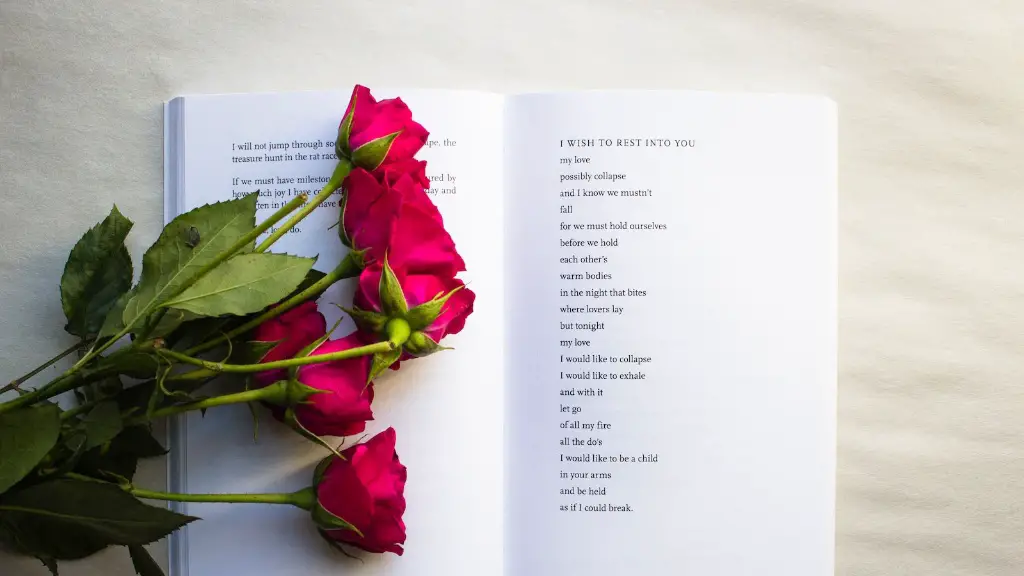Poetry has been around since ancient times. It is a form of art that expresses emotion and ideas in words. Poetry is used to capture personal experiences and observations, to explore powerful and intense emotions and to express beauty, sadness or joy. People around the world are drawn to it for its beauty and its ability to connect emotionally with the reader. Many people love the impact of poetry and its power to help them understand their own thoughts and feelings.
One of the things that many people enjoy about poetry is it’s ability to convey deep feeling and emotion in a few carefully chosen words. The use of similes, metaphors and alliteration can be employed in powerful ways, to evoke emotion and create a new and unique perspective. In many ways, a poem can be as powerful as a painting or a piece of music. Poetry can be inspiring, thought provoking and uplifting.
People also appreciate the wide range of forms and styles of poetry. From the traditional to the experimental, poetry offers something for everyone. Poets often pull from a wide range of influences, from mythology to pop culture, creating something beautiful and unique. Moreover, with its accessibility on the internet, it is easier than ever to find a great poem – no matter one’s preferences.
Another great thing about poetry is that it translates across boundaries and cultures. Whether it’s oral or written, traditional or contemporary, poetry has the ability to bring people together. As a form of artistic expression, poetry can help bridge cultural divides and bring about greater understanding.
The brevity of poetry is another feature that draws many people in. Like a haiku or a sonnet, with its limitations of form, poetry can capture a moment or emotion in a few words, allowing it to make an immediate and strong impression. What’s more, concise and creative poetry has taken on more of an importance in the age of social media, often inspiring shares and discussions on Twitter, Instagram and other platforms.
Finally, the creativity of poetry is something to admire. Writing poetry requires the poet to delve deep into the human experience, drawing from their personal background and perspective to create something unique. The possibilities are endless, making writing poetry a very rewarding experience.
The Role of Metaphors
Metaphors play an incredibly important role in poetry. They can be used to convey meaning in a way that other words cannot. Metaphors can paint vivid images in a reader’s mind and create conversations between disparate ideas. It is a tool that poets use to move the reader emotionally, to evoke feelings that the poet cannot express directly. As such, metaphors can be powerful vehicles of poetic expression.
Metaphors also provide a way for the poet to bring diverse elements together in a unified construction. Through the use of metaphor, the poet can explore themes, invoke memories and provide deep insight in ways that might be difficult to do in other ways. Metaphors also provide a way for the poet to communicate his or her deepest thoughts and feelings, allowing the reader to be brought into another world in the poet’s mind.
At their best, metaphors can be clever and thought provoking. They can bring an idea to life, help to make connections between seemingly unrelated elements and provide a unique and resonant perspective. Poets often use metaphor to provide depth to the meaning of a poem, helping the reader to understand the subtle nuances in the words, and to unravel the intent of the poet.
Poets are often masters of metaphor and metaphor is often key to the impact of a poem. Through the subtlety of metaphor and its ability to evoke emotion and draw the reader into the poet’s world, poetry can often be incredibly moving and powerful.
The Impact of Poetry on Mental Health
Research has shown that creative writing, including poetry, can have a positive impact on mental health. Writing is a form of self-expression, allowing the writer to explore his or her emotions, thoughts and beliefs in a safe and healthy way. By exploring these feelings, writers can gain a better understanding of themselves and how to better manage their emotions.
Writing poetry can be particularly beneficial for mental health. The structured nature of writing a poem allows the writer to express his or her feelings in a creative and effective way, while also managing the language and words that they use in order to make the poem more powerful. Writing allows the writer to be honest and vulnerable, allowing hidden feelings to emerge and be processed.
Moreover, poetry can be used as a means to cope with difficult emotions and experiences. Writing poetry can be a cathartic experience and the words can have a powerful impact on the writer. By recognizing and expressing difficult emotions and thoughts, the writer can find the resolution that they need, while also understanding themselves better.
The impact of poetry on mental health is becoming an increasingly researched and recognized topic. Writing a poem is being recognized as an effective means to process emotions and to alleviate psychological distress. Poetry can be used as a way to make sense of experiences, to express feelings and to help the writer gain insight into their own emotional and mental state.
Conclusion
There are many reasons why people may love poetry. From its power to evoke emotions to its brevity, poetry can be a powerful force for conveying meaning and making a deep connection with the reader. Moreover, the diverse range of forms and styles can also provide something for everyone. Even the creative use of metaphors in poetry can have a huge impact on the reader.
The impact of poetry on mental health is also being increasingly recognized. Writing a poem can be an effective way to process emotions and achieve resolution. As a form of creative expression, poetry can be a powerful tool for self understanding and emotional management.




